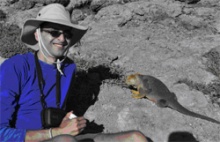Genomics in partial asexuals

Aneil Agrawal, University of Toronto , a.agrawal@utoronto.ca
Some of the most productive organisms on earth reproduce asexually much of the time. Much of evolutionary genomic inference relies on coalescence but almost all previous theory assumes full sex (or haploidy). I will discuss our recent work integrating partial asexuality into the coalescent framework to understand how low rates of sex affects coalescence in a variety of ecological scenarios (e.g., with population structure as well as spatial and temporal heterogeneity in sex rates) and highlight the importance of gene conversion. I will also how low rates of sex greatly enhance background selection, thereby reducing effective population size, via two separate effects. Finally, I will present our new population genomic data from a facultatively sexual plant, the duckweed Spirodela polyrhiza.
Contact: Thomas Lenormand thomas.lenormand@cefe.cnrs.fr
Contact du Comité SEEM: seem@services.cnrs.fr.


